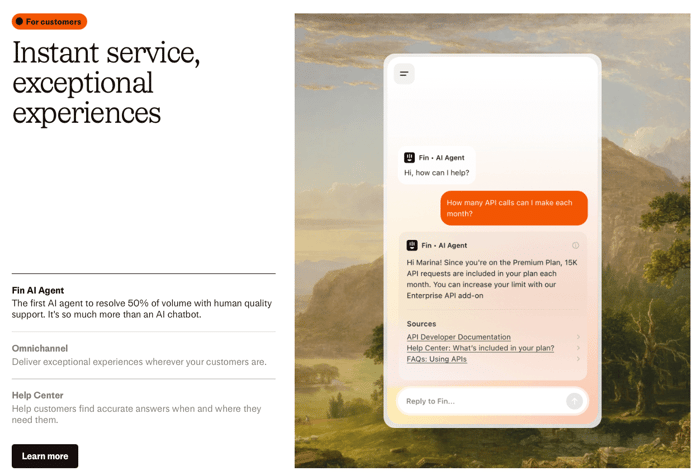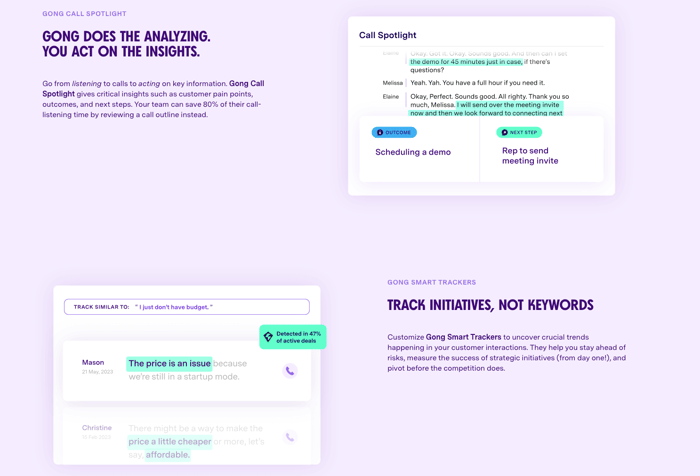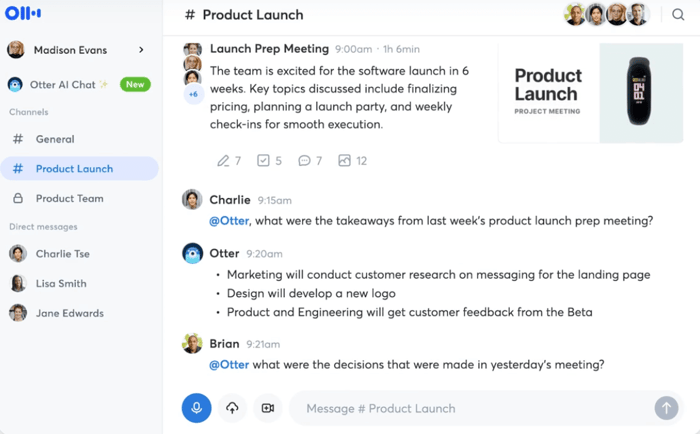A Guide to AI Integration: How to Implement AI Assistants in Your Business

This is hardly surprising, since AI assistants are becoming capable of handling more business processes almost day-by-day. On top of its generative capabilities, it also lets organizations speed up research and automate big data analyses, saving months (if not years) in manual work. That said, to get results from an AI assistant, your organization needs to be clear on its goals and the problems it will solve.
Understanding AI assistants role in business
At a high level, AI assistants for business can be divided into two categories. The first includes customer-facing tools, with chatbots being the most common example, helping businesses handle routine client requests.
The second category includes tools that manage back-end tasks, such as coding, data analysis, and automating agentic workflows. How you use them depends on factors like your industry, organizational structure, and existing systems.
Whether you plan to use one category or both, it's essential to be crystal clear on your company’s needs and capabilities before getting started.
How to Use AI assistants for different use cases
Customer service automation: AI can assist clients effectively when trained on customer personas and real-life data from your CRM. Beyond traditional chatbots, these tools can provide personalized support and resolve routine inquiries with precision.
For instance, Intercom AI and Zendesk AI streamline support workflows by automating common queries, categorizing tickets based on urgency or topic, and escalating complex issues to human agents.

Image Source: Intercom AI
Coding support: AI in software development is another incredibly powerful – and popular – business use case. According to Stack Overflow, 76% of software engineers say that they use AI assistants in their work, and 72% are happy with the output. These assistants can automate a lot of repetitive tasks for software developers and boost their efficiency. Among others, these AI tools can help with code generation, debugging existing code, and running analyses to predict potential issues in datasets.
For example, GitHub Copilot helps developers streamline their workflows by providing real-time code suggestions and debugging assistance.

Image source: StackOverflow
Process automation: A lot of tasks we deal with daily can be automated, these include data entry, invoice processing, and HR administration. Using AI assistants to tackle these gives employees more time to focus on creative, or strategic work, all the while improving operational efficiency.
At Netguru, we created an AI-powered tool called Memory to improve knowledge transfer between departments. Memory streamlines the flow of information and speeds up research, helping our teams access project data and specialized knowledge more efficiently. The goal was to enhance collaboration and make our internal processes more agile.
Research & development: Widely adopted in healthcare and pharma, AI assistants excel in big data analysis, helping organizations extract insights from internal data, scientific literature, and external databases to drive innovation.
A good example is Merck, whom we’ve helped build an AI R&D assistant and cut time needed for chemical identification time from 6 months to 6 hours. Their AI assistant is able to:
- Analyze and identify chemicals mentioned in articles and link them to Merck’s Catalog database
- Retrieve information on additional chemical properties from external research
- Assign naming conventions and unique codes for newly-formulated molecules.
Inbox and email workflows: AI tools address the challenges of email overload by automating tasks such as categorizing messages, scheduling sends, and generating quick reply templates tailored to the context of the message.
For instance, Superhuman uses AI to prioritize important emails, declutter inboxes, and streamline responses, allowing users to focus on high-value communications.
Accounts payable and financial workflows: AI tools in this area can extract data from invoices, cross-reference it with purchase orders, and flag discrepancies for review. They also track expenses in real-time and simplify multi-level approval processes.
Stampli, for instance, centralizes invoice processing, assigns approvers, and detects anomalies, ensuring faster and more accurate accounts payable workflows.

Image source: Stampli
Sales call analysis and performance coaching: AI tools analyze sales calls to identify customer engagement patterns, objections, and deal progress. These insights help refine sales strategies and improve team performance.
For instance, Gong AI records and evaluates calls, offering data-driven recommendations for coaching and optimizing sales techniques.

Image Source: Gong AI
Data summarization and information retrieval: AI streamlines the search for documents and data by consolidating information from multiple systems and providing concise summaries.
Glean AI, for example, helps teams break down information silos, retrieve relevant documents, and improve knowledge accessibility across departments.
Virtual meeting assistance and summarization: AI tools transcribe meetings, generate summaries, and extract actionable insights in real time.
For example, Otter.ai allows teams to focus on discussions by automating note-taking and highlighting key points.

Source image: Otter.ai
Automating marketing and social media content creation: AI accelerates marketing workflows by generating ideas, drafting posts, and optimizing captions for better engagement.
Tools like Jasper AI and Copy.ai help marketers quickly create compelling content for social media and campaigns.

Image source: Jasper AI
Real-time translation and language support: AI-powered translation tools provide instant multilingual support for customer interactions and global communications.
Google Translate and DeepL enable businesses to bridge language gaps, improving accessibility and international reach.
Integrating AI assistants best practices
Understanding current business processes
It’s never a good idea to use AI just for the sake of using AI. First, you need to understand your current processes – this means process mapping. It’s a method for visually documenting all the steps included in a specific workflow. For example, a customer support department could map out their process starting from customer query submission to resolving the issue.
By thoroughly visualizing all the processes, businesses can identify redundancies and areas which should be optimized or automated to enhance business operations. Blindly implementing AI assistants can lead to disruptions.
Garbage In, Garbage Out principle
Have you ever heard of the “garbage in, garbage out” principle? It’s highly relevant when it comes to AI assistants. It says that the quality of the output will depend on the quality of the input i.e., the data you feed AI with.
Imagine if you ran a retail company and wanted to predict customer buying behavior. Instead of feeding AI with up-to-date data, you used historical data which failed to reflect recent market changes. The result? Lack of alignment between inventory levels and customer demand.
Before integrating AI into their workflows, organizations must ensure that the data is accurate, relevant, and well-organized.
Refining processes for automation
Use process mapping not only to understand your company’s existing workflows, but also to improve your processes before you automate them. Assess which tasks could be handled by an AI entirely, and which ones require human intervention (either partial or full).
For example, your marketing team could “nominate” routine tasks like content edition for SEO purposes, and transcripts from interviews. This would leave them more time for strategic and creative work.
Identifying bottlenecks
Mapping out your company’s current processes might reveal the most problematic – or manual-intensive – tasks that could be automated or optimized with the help of AI.
For example, a logistics company could discover that the order processing stage is taking too long, as a human employee needs to manually enter data from one system to another. Instead, they could set up an AI that would automatically derive these details. As a result, the company would be able to speed up order fulfillment.
Strategic planning
The process mapping I mentioned earlier should be the basis for strategic planning for AI deployment. It helps ensure that AI is implemented in areas where it can bring value without disrupting existing processes. This strategic planning is crucial for successful AI implementation, as it involves defining precise needs and goals before starting the implementation process.
For instance, after process mapping a bank might conclude that their onboarding process for new clients takes too much time and is too complex. By implementing an AI assistant for document verification and collection, the company can streamline the onboarding process, reduce staff’s workload, and most importantly, boost the client experience.
Most common pitfalls of integrating AI assistants into business operations
Overestimating AI capabilities
We all need to hear this – AI isn’t a remedy to all problems. While it has a big potential to improve processes, it will not solve all your issues. It’s best to adjust your expectations to avoid frustration and disappointment, especially at the early stages of adoption.
The effectiveness of AI will depend on a few things: what you use it for, the data you feed it with, and how well it integrates with your current workflows. Before you implement AI assistants, you need to become aware of their limitations and understand that successful implementation is a gradual process. Most probably, it will require a few iterations before it starts producing the desired results, so don’t get discouraged.
Lack of clear objectives
Many organizations jump into AI without fully understanding what they want to achieve by using it. That’s why I strongly advise you to set specific KPIs that you’ll use to measure success of any AI initiative. For instance, if you’re an ecommerce business currently struggling to provide fast response time, your objective could be to reduce it by 50%. Alternatively, you could measure success by checking if your AI assistant helped improve your company’s customer satisfaction score.
You need to have a sense of clarity, i.e., what specific problem does each AI system help solve.
Data quality issues
As I’ve mentioned, AI relies heavily on your data’s informational value and its accessibility. If records are incomplete, outdated, or even accidentally duplicated, it can lead to irrelevant AI output. And the reason why this happens, in the first place, is because some businesses don’t pay enough attention to business data preparation. In short, before you decide to test your AI – let alone, trust its output – your AI experts should ensure that all records are in a relevant format.
Implementing robust data management practices, such as data cleaning and validation, is essential to ensure high data quality for effective AI functionality.
Neglecting this step in AI integration could make you trust untrue insights, and lead to poor decision-making and potentially significant business setbacks.
Trying to implement AI at scale too early
It might be tempting to roll out AI solutions organization-wide as soon as it starts generating relevant output. However, if you don’t test or optimize your early-stage system, it could backfire.
The market has seen quite a few of such mistakes. One of the best cautionary tales is the infamous case of Amazon. The company, who’s always been a pioneer in new tech, was among one of the first to roll out an AI-powered recruitment system. Unfortunately, they didn’t test its accuracy (and inclusivity) well enough before launch, and accidentally introduced bias into the candidate selection process. Applicants soon noticed that the AI favors men, as it was trained mostly on data on male staff. This caused a significant employee branding crisis.
To avoid this, I recommend starting small with a well-defined proof of concept (PoC) or pilot program. Try out your AI in a controlled environment, gather feedback, and make necessary adjustments. Once the PoC has been proven effective, you can gradually integrate AI for commercial or organization-wide use.
Lack of change management
AI cannot function on its own; after all, it’s just a tool that has to be used by people. This might call for some adjusting and a change of habits. That’s why strong change management practices are essential to successfully integrate AI solutions into existing workflows.
Some employees, including software developers, can fear AI. Also, they’re used to doing things in a certain way, and habits are hard to change. Employees need to understand how AI will impact their roles. Provide adequate training to ensure they know how to effectively use it. Without proper support and communication you might experience resistance from the employees, which will hinder AI adoption.
EU AI Act: restrictions and considerations
The European Union is working on the EU AI Act, a regulatory framework, which aims to guarantee a safe, transparent and non-discriminatory use of AI systems. Humans will oversee AI to prevent harmful outcomes. The AI Act is set for full implementation in 2026, so businesses have very little time to prepare.
There will be rules put in place that will categorize AI systems based on their risk levels – these will apply to both providers and users. Systems posing unacceptable risk include (but aren’t limited to) social scoring, manipulating behavior, and real-time biometric identification, and are banned. There might be some exceptions like using biometrics for law enforcement, however, these will be allowed under strict conditions only.
High-risk AI systems are those which pose a threat to safety or rights, including those used in products like medical devices or in areas such as infrastructure, education, and law enforcement. Such systems must be registered and overseen. The main goal of the EU AI Act is to warrant a responsible development of AI, minimizing risks without limiting innovation.
In order to stay compliant, product leaders will have to:
- Stay updated on AI Act changes
- Understand their product and processes
- Know prohibited practices
- Comply with high-risk system requirements
- Maintain transparency and documentation
- Mitigate risks.
Awareness is the key to successful AI integration
The case of incorporating AI assistants in business is the same as for any other system – you need to know what goals you want to achieve with it. Begin by mapping out your company’s existing processes. If you identify any bottlenecks, investigate further if it’s something that requires full human attention, or can be fully handled (or simplified) with the help of AI.
If you're struggling to implement AI in your internal processes, we recommend Netguru’s AI Primer workshop. This session helps identify and prioritize AI opportunities that can drive innovation and business transformation. Through a blend of strategic ideation and practical exploration, the workshop highlights AI’s potential to improve communication, efficiency, and customer experience. By working with data scientists and product experts, you'll leave with actionable insights on how AI in business can be integrated into your existing processes to create real value.






